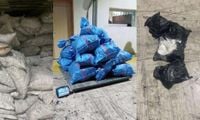Authorities in Morocco have successfully thwarted a significant attempt to smuggle a massive quantity of cocaine through the port of Tangier, an operation that took place on Tuesday, May 6, 2025. The seizure involved 514 kilograms of the highly potent drug, which was cleverly concealed within a container loaded with coal, intended for transit to Belgium.
This operation was the result of a coordinated effort between the national police and the customs administration, which acted on precise intelligence regarding a suspicious shipment originating from a South American port. The container was flagged as it made its way to the Tangier Med port, which has become a critical point for drug traffickers seeking to enter the European market.
According to reports, three containers were subjected to rigorous inspections using advanced detection technologies. The cocaine was found hidden within the coal, a method designed to evade the scrutiny of customs and security forces. Sources indicate that the shipment had been prepared with intricate concealment techniques, reflecting the lengths to which traffickers will go to circumvent law enforcement.
Following the successful interception, the national police have been instructed by the public prosecutor to conduct a thorough investigation. This inquiry aims to identify all individuals involved in the smuggling operation, both within Morocco and internationally. There are suspicions that this shipment is linked to a broader network engaged in the trafficking of hard drugs into Europe.
The authorities' vigilance in this case highlights the ongoing battle against drug trafficking in the region. Morocco has been a significant player in the global drug trade, often serving as a transit point for narcotics destined for Europe. The strategic location of Tangier Med port makes it an appealing option for smugglers looking to exploit maritime routes.
While this operation marks a significant victory for Moroccan authorities, it also underscores the challenges they face in combating organized crime. The complexity of drug smuggling operations often involves sophisticated networks that span multiple countries, making it difficult to dismantle these operations entirely.
In recent years, the Moroccan government has ramped up its efforts to combat drug trafficking, implementing stricter border controls and enhancing cooperation with international law enforcement agencies. These measures are critical as the country continues to grapple with the dual challenges of drug trafficking and substance abuse within its own borders.
The seizure at Tangier Med port is not an isolated incident; it reflects a broader trend of increasing drug seizures in the region. Authorities have reported a rise in the volume of narcotics intercepted at Moroccan ports, a worrying sign that drug trafficking networks are becoming more active.
As the investigation unfolds, Moroccan officials are likely to face pressure to provide updates on their progress in tracking down the masterminds behind this operation. The public and international observers will be keen to see how effectively Moroccan law enforcement can respond to this challenge and prevent future attempts at drug smuggling.
In conclusion, the successful interception of half a ton of cocaine at the Tangier Med port serves as a reminder of the ongoing fight against drug trafficking. It highlights both the determination of Moroccan authorities to combat this issue and the persistent challenges posed by well-organized smuggling networks.

